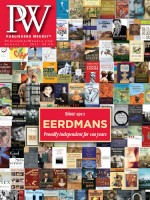Tell anyone familiar with book apps that there isn't a market for such content, or that there haven't been any successful book apps to date, and you will hear two words: the Elements. The app, based on Theodore Gray's bestselling and visually driven science book of the same name, has been purchased well over 100,000 times and is consistently cited as the gold standard in the genre. While the Elements app, which retails for $13.99, may still be an outlier in the burgeoning book app field, Gray is confident enough in the area that he's started an app company, TouchPress, because, as he sees it, "there is a market there, and it will grow."
TouchPress was launched after Gray created his own app for The Elements, which Black Dog & Leventhal published in 2010. The book, which has sold over 300,000 copies, is a rendering of the periodic table of elements with beautiful photographs displaying each element alongside unexpected information, ranging from historical anecdotes to odd factoids. Although there was never an app planned to accompany the book, after the title started really selling, Gray began thinking about creating something on his own that might work for what was, at the time, the much-hyped tablet device coming from Apple.
After Apple head Steve Jobs announced in February 2010 that the iPad would be going on sale in 60 days, Gray rushed to create an app version of his book. Working with a business partner, Max Whitby, who he had helped him with The Elements with, Gray was able to get the Elements app out in time for the iPad launch. Relying on relationships he'd developed with Apple through his software company, he was also able to get the Elements some very prime placement—the app was on iPads that went out to the press and was included in advertisements and promotional material for the device.
While Gray readily admits that the free marketing the Elements app received helped lift sales, he doesn't think the title is an anomaly. Since the Elements, TouchPress—which Gray (whose title is creative director) runs with Whitby (CEO) and John Cromie (CTO)—has released three other apps. Two titles, the Solar System and the Wasteland, both created out of a deal struck with U.K. publisher Faber & Faber, recouped their production costs in under a month, while Gems, based on an eponymous book published by the University of Chicago Press, has been selling much more slowly. Gray is still trying to figure out what went wrong with Gems, but the success of the Wasteland, based on the T.S. Eliot poem, proves that TouchPress need not focus solely on heavily illustrated nonfiction (which has been the basis of all its other apps).
With no interest in doing for-hire work, TouchPress only does copublishing deals, and Gray sees the company continuing in this mold. Currently turning away more publishers than he accepts, Gray and his partners have six projects in the pipeline, and one thing he is still figuring out, he said, is how big a workload the company can handle. Gray estimated that TouchPress apps usually take about six to nine months to create.
Although there are hurdles in publishing and promoting apps, Gray believes the process isn't so different from publishing and promoting print books; there's more than a little artistry involved in creating the product and more than a little luck involved in promoting it. While Gray said the attention a book app gets can often be at Apple's whim—the best kind of promotion is being featured in the App Store—the fact that the book app area is still new means it doesn't take as many sales to land on the bestseller list.
The million-dollar question, of course, is how much money should be invested in apps. While Gray said there's no real way to answer that, aside from trial and error, he scoffs at the notion that book apps can't sell. Recognizing apps as simply another evolution in the format of the book, Gray thinks the key is reinvention. "We recognized there is a new technology which happens to not be paper... and we're trying to invent what kind of book one ought to do within that framework. And we don't feel bound by what books have been in the past."



 Volume 258
Issue 31
08/01/2011
Volume 258
Issue 31
08/01/2011





